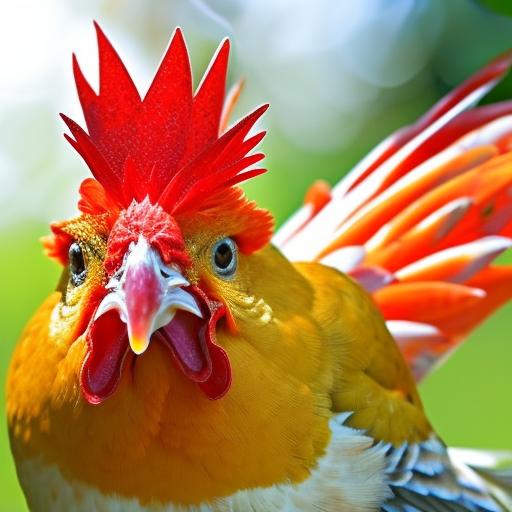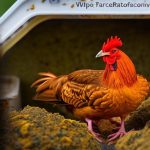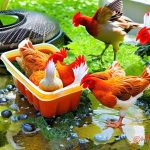Keeping chickens cool in the summer is crucial for their health and well-being. Chickens are highly susceptible to heat stress, which can have negative effects on their overall health and productivity. Heat stress occurs when chickens are unable to regulate their body temperature effectively, leading to a range of symptoms and potential health issues. As responsible chicken owners, it is our duty to provide a comfortable environment for our feathered friends during the hot summer months.
Key Takeaways
- Keeping chickens cool in summer is important for their health and well-being.
- Signs of heat stress in chickens include panting, lethargy, and decreased egg production.
- Providing shade and maximizing ventilation can create a comfortable environment for chickens.
- Water is the ultimate cooling agent for chickens, and they should have access to it at all times.
- Adjusting feeding, promoting dust baths, and scheduling activities can also help keep chickens cool in hot weather.
The Effects of Heat Stress on Chickens: Signs and Symptoms to Look Out For
Heat stress in chickens can manifest in various signs and symptoms that should not be ignored. Some common signs include panting, droopy wings, open-mouthed breathing, reduced activity levels, and decreased appetite. Chickens may also exhibit increased water consumption and seek out shady areas in an attempt to cool down. If left untreated, heat stress can lead to more severe health issues such as dehydration, decreased egg production, and even death.
Providing Shade: Creating a Comfortable Environment for Your Chickens
Providing shade is essential for keeping chickens cool in the summer. Shade helps to reduce the direct exposure to sunlight and lowers the ambient temperature around the chickens. There are several ways to provide shade for your flock. Planting trees or installing umbrellas in their outdoor area can create natural shade spots. Additionally, using shade cloth or tarps can be an effective way to create shaded areas within the coop or run.
Ventilation: Maximizing Airflow in Your Coop
| Metrics | Description |
|---|---|
| Airflow rate | The amount of air that moves through the coop per unit of time |
| Temperature | The degree of hotness or coldness of the air inside the coop |
| Humidity | The amount of moisture in the air inside the coop |
| CO2 levels | The concentration of carbon dioxide in the air inside the coop |
| Ammonia levels | The concentration of ammonia in the air inside the coop |
| Dust levels | The amount of dust particles in the air inside the coop |
Proper ventilation is crucial for maintaining a comfortable environment for your chickens during hot weather. Good airflow helps to remove excess heat and humidity from the coop, preventing heat buildup. Windows and vents should be strategically placed to allow for cross ventilation. Installing fans can also help circulate air and keep the coop cool. It is important to ensure that the coop is well-ventilated without creating drafts that could be harmful to the chickens.
Water: The Ultimate Cooling Agent for Chickens
Water is the ultimate cooling agent for chickens. It is essential to provide a constant supply of fresh, cool water for your flock during hot weather. Chickens will drink more water to stay hydrated and regulate their body temperature. Waterers should be checked regularly to ensure they are clean and filled with cool water. Adding ice cubes to the waterers can help keep the water cool for longer periods. It is important to monitor water consumption and refill as needed to prevent dehydration.
Hydration: Ensuring Your Chickens Stay Hydrated in Hot Weather

In addition to providing water, there are other ways to encourage hydration in chickens during hot weather. Adding electrolytes to their water can help replenish essential minerals lost through sweating and panting. Electrolytes can be purchased from feed stores or made at home using a recipe specifically designed for chickens. Another way to encourage hydration is by offering watery treats such as watermelon or cucumbers. These treats not only provide hydration but also offer a refreshing snack for your flock.
Feeding: Adjusting Your Chickens’ Diet for Summer
Adjusting your chickens’ diet during the summer months can help them cope with the heat more effectively. Feeding a balanced diet that includes fresh fruits and vegetables can provide additional hydration and nutrients. Water-rich foods such as watermelon, cucumbers, and leafy greens are excellent choices. Avoid feeding heavy or fatty foods that can increase body heat production. It is also important to monitor feed consumption and adjust portion sizes accordingly, as chickens may eat less during hot weather.
Dust Baths: Promoting Natural Cooling and Hygiene
Dust baths are not only important for maintaining good hygiene in chickens but also serve as a natural cooling mechanism. Chickens instinctively take dust baths to remove parasites and excess oil from their feathers. The act of rolling in dry dirt or sand helps to cool down their bodies by absorbing excess moisture and providing a layer of insulation. Providing a designated area with loose dirt or sand for your chickens to take dust baths is essential for their overall well-being during the summer months.
Timing: Scheduling Activities to Avoid the Hottest Parts of the Day
Scheduling activities around the hottest parts of the day is crucial for minimizing heat stress in chickens. It is best to avoid strenuous activities such as feeding, cleaning the coop, or moving chickens during the peak heat hours. Instead, plan these activities for early morning or late evening when temperatures are cooler. This will help reduce the risk of heat stress and allow your chickens to rest and cool down during the hottest parts of the day.
Emergency Preparedness: Knowing What to Do in Case of Heat-Related Emergencies
Being prepared for heat-related emergencies is essential for the well-being of your flock. In case of extreme heat, it is important to provide immediate relief to your chickens. This can be done by providing cool water, misting them with water, or moving them to a cooler location such as a shaded area or an air-conditioned space if available. Monitoring their behavior and seeking veterinary assistance if necessary is also important. Having a plan in place and being proactive can help prevent serious health issues and potentially save lives.
Keeping chickens cool in the summer is crucial for their health and well-being. Heat stress can have negative effects on chickens, including decreased egg production and potential health issues. By providing shade, maximizing ventilation, ensuring access to cool water, promoting hydration, adjusting their diet, encouraging dust baths, scheduling activities wisely, and being prepared for emergencies, we can create a comfortable environment for our feathered friends during the hot summer months. It is our responsibility as chicken owners to take action and ensure our chickens stay healthy and comfortable in the heat.
If you’re a chicken owner, you know how important it is to keep your feathered friends comfortable, especially during hot weather. One essential aspect of chicken care is providing them with a suitable coop. In an article titled “How to Keep Chickens Cool in Hot Weather,” Poultry Wizard offers valuable tips and advice on creating a chicken coop that promotes ventilation and helps regulate temperature. From choosing the right materials to incorporating shade and proper insulation, this article covers everything you need to know to ensure your chickens stay cool and healthy during scorching summer days. Check out the article here for more information.
FAQs
What is the ideal temperature range for chickens?
Chickens are comfortable in temperatures ranging from 50-80°F. Anything above 80°F can cause heat stress and discomfort.
What are the signs of heat stress in chickens?
Signs of heat stress in chickens include panting, lethargy, loss of appetite, decreased egg production, and even death.
How can I keep my chickens cool in hot weather?
You can keep your chickens cool in hot weather by providing shade, plenty of fresh water, and good ventilation in their coop. You can also use fans or misters to cool the air around them.
What kind of shade is best for chickens?
Natural shade from trees or bushes is best for chickens, but you can also provide artificial shade using tarps or umbrellas.
How often should I change my chickens’ water in hot weather?
You should change your chickens’ water at least once a day in hot weather to ensure it stays clean and fresh. You can also add ice to the water to keep it cool.
Can I give my chickens ice to cool them down?
Yes, you can give your chickens ice to cool them down. You can add ice to their water or give them frozen fruits and vegetables as a treat.
What should I do if my chickens show signs of heat stress?
If your chickens show signs of heat stress, move them to a cooler area immediately and provide them with fresh water. You can also give them electrolytes to help rehydrate them. If their condition does not improve, contact a veterinarian.
Meet Walter, the feathered-friend fanatic of Florida! Nestled in the sunshine state, Walter struts through life with his feathered companions, clucking his way to happiness. With a coop that’s fancier than a five-star hotel, he’s the Don Juan of the chicken world. When he’s not teaching his hens to do the cha-cha, you’ll find him in a heated debate with his prized rooster, Sir Clucks-a-Lot. Walter’s poultry passion is no yolk; he’s the sunny-side-up guy you never knew you needed in your flock of friends!







